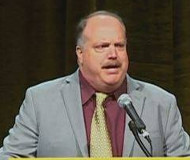7/21/2017
Colorado Ballot Measure Would Block Traffic Stop ProfitProposed Colorado ballot initiative would take the financial incentive out of traffic enforcement.

Local law enforcement agencies would no longer be able to rely on highway traffic stops to enhance their budget if voters endorse a proposal currently circulating in Colorado. The group Stop the Shakedowns, led by activist Steve Kerbel, hopes to collect the 98,492 signatures needed to put an initiative on the 2018 ballot that would take the profit incentive out of police work.
"A conflict of interest exists when any entity of government enforces a law and at the same time receives the financial benefit via the activities of enforcement," the proposal explains in its preamble. "These enforcement activities have created a mistrust of our law enforcement entities that must be corrected in order to restore a more peaceful and trusting relationship between the citizens of the state of Colorado and our enforcement entities."
The measure would repeal the existing Colorado statute that divvies up traffic fine revenue between the state treasury and local authorities. Currently, any town setting up a speed trap is entitled to a 50 percent share of the profit generated within city limits, with the remainder going to the state.
The "Anti Shakedown" initiative would require all fines and penalties to be paid in the form of direct restitution to a victim, or if there is no victim, to a registered Colorado-based charity. Individuals would not be allowed to donate to any charities in which they have a direct or indirect financial stake.
The proposal's wording takes into account what has happened in the states of Florida and Texas, where portions of red light camera fine profit by law are devoted to trauma centers. In Texas, government officials have not actually been making the required payments to trauma centers, and the funds have been used to balance the state budget. In Florida and Texas, the prospect of funding creates a vested interest that encourages the health care industry to lobby in favor of photo enforcement.
Under the ballot proposal, the government would never be able to get its hands on the money, as motorists would have sixty days to make a direct payment to a charity and provide proof to the government. By allowing individuals to select from thousands of charities, the process would not create a new vested interest in speed traps.
"No matter how much money is taken from the people, this lust for more and more money will ever increase, and that money taken from all of us will be used more and more for activities which create and sustain more and more creative ways to get your money," Kerbel explained. "If we stand together, we the people can end this vicious cycle."
Article Excerpt:Anti-Shakedown initiative
Be it enacted by the people of the state of Colorado:
Section 1. Declaration of the people of the state of Colorado:
A conflict of interest exists when any entity of government enforces a law and at the same time receives the financial benefit via the activities of enforcement. These enforcement activities have created a mistrust of our law enforcement entities that must be corrected in order to restore a more peaceful and trusting relationship between the citizens of the state of Colorado and our enforcement entities.
Some jurisdictions in our state routinely take advantage of laws strictly for the purpose of forcibly taking funds from the people for their own use. It is common practice for some regulatory entities within the state to fine businesses with impunity because they receive the benefit of the funds generated by these fines or other financial penalties.
The people of state of Colorado hereby assert that it is time for a change to this system which removes this conflict of interest, and grows a more trusting relationship between the people and our government.
Section 2 --
Colorado revised Statutes, 42-1-217 shall be stricken in its entirety, and replaced with the following:
Any and all fines, forfeitures or financial penalties of any kind assessed by any government entity within the state of Colorado or contractor thereof; must not be paid to any entity of government whatsoever. Any such fines, forfeitures and penalties are to be fully satisfied with a payment equal to the fine, forfeiture or penalty by the penalized individual or other entity first in restitution to an actual victim of the act, or in the absence of a victim, to a registered and legitimate charity of the penalized person's choice anywhere in the state of Colorado, in which the penalized person or entity has no financial self-interest, either directly or indirectly.
Any government entity, court or jurisdiction must clearly notify all penalized parties of this statute immediately following any assessment of any financial penalty. Any and all penalized parties shall have 60 days to make payment and provide proof of such payment in order to fully satisfy any such penalty.
Section 3 --
Colorado revised Statutes, 42-4-1409 (9) shall be stricken in its entirety.
Section 4 -- Effective Date -- applicability
This statute shall become effective on January 1, 2019 and will not sunset.


